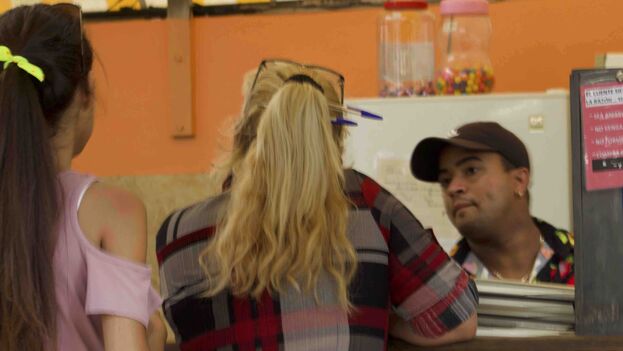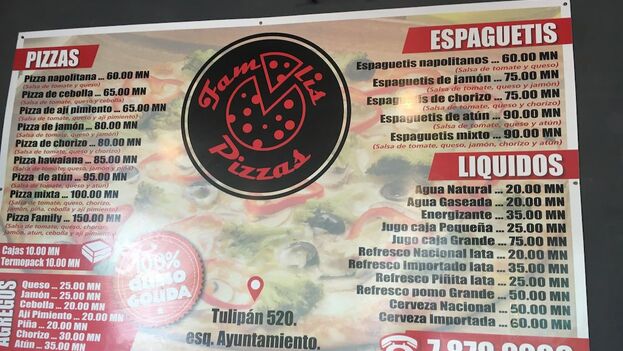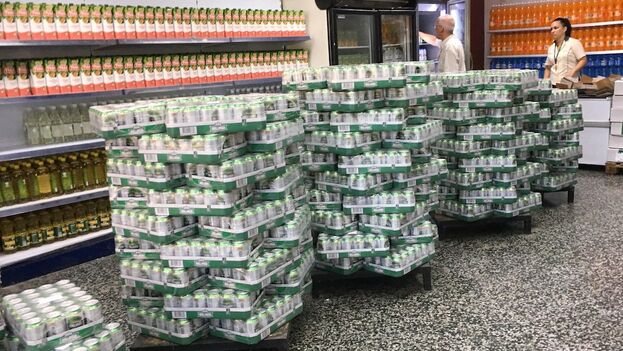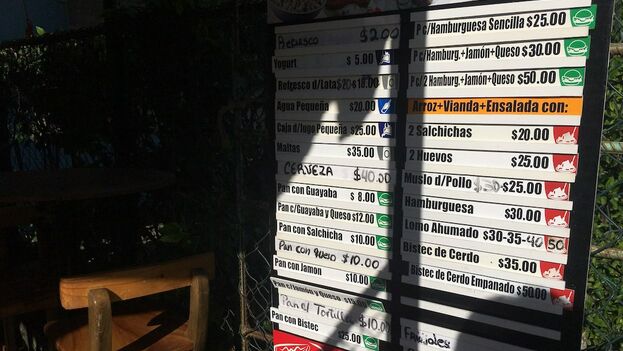
![]() 14ymedio, Havana, August 1, 2019 — Notice boards of missing products or those corrected in a hurry are part of the scene this Thursday as capped prices of drinks go into effect in private cafes and bakeries in Havana, a governmental measure that intends to contain inflation after the salary increase in the state sector.
14ymedio, Havana, August 1, 2019 — Notice boards of missing products or those corrected in a hurry are part of the scene this Thursday as capped prices of drinks go into effect in private cafes and bakeries in Havana, a governmental measure that intends to contain inflation after the salary increase in the state sector.
“20 pesos,” responds an employee of a private cafe in El Vedado in a low voice, when, the day before the law started to apply, a mother asks him how much an orange soda costs. Private workers have spent days preparing themselves for the price regulation, which also affects industrial juices, bottled water, and beer.
The fear that the law will entail a reinforcement of the presence of undercover inspectors and that customers will denounce those who maintain former prices has led many to modify the prices days before the official date for its entry into force, while others maintained them until the last minute of July 31.

In many of the private cafes and bakeries that opened in the early hours of August 1, crossed-out prices could still be seen, now replaced by lower figures, but in the majority of places one had to ask.
The new rates stipulate that domestically produced beer be fixed at 30 CUP (1.25 CUC); imported beer at 35 pesos (1.45 CUC); and soda in 1.5-liter bottles cannot be more than 30 CUP and in cans 18 CUP.
In a brief trip through the Nuevo Vedado neighborhood, the most obvious thing was that late yesterday night, July 31, Hollandia beer was stocked at the Tulipán store. At the price of 1 CUC per can (roughly $1 US) and with a maximum limit of five cases of 24 cans per customer, there had already been a line since the early hours.
“If every day there was this supply, you could understand capped prices,” commented the owner of a bar-cafe. “We’ll see how long it lasts.”
In a pizzeria on Tulipán street, prices remained at 40 and 50 CUP for domestic beer and 60 for imported, but the sales clerk said that as soon as the cashier arrived, they would make a decision about taking down the sign or amending it.
Employees of various private restaurants in the Plaza de la Revolución municipality confirmed to 14ymedio that, although the measure doesn’t apply to private restaurants, they have been summoned to a series of meetings where authorities have asked them not to increase prices. In those meetings, representatives of the Provincial Administration Council of Havana have promised to not raise prices in state-owned retail markets, where self-employed workers buy a good part of their products.
“Personally it doesn’t affect me so much, because in addition to canned soda I sell juices and natural fruit smoothies that we make right here,” Néstor, an entrepreneur with a small kiosk in an arcade in the Calzada del Cerro, tells this newspaper. “But I also sell plenty of cola and lemon sodas, because the pediatric hospital is close by and parents prefer to bring drinks that are sealed and more secure to the children that are patients.”
Despite the fact that his pocket will not be among the most harmed by the new law, Néstor believes that “the self-employed weren’t consulted at all before they applied a measure like this to us. When the time comes to pay taxes and hand over part of our earnings, they announce it with plenty of time beforehand, even on television, but when it’s time to make a decision like this, they say it practically from one day to the next.”
That the capped prices include small private cafes and places that sell breads and baked goods but not private restaurants is, in Néstor’s opinion, discrimination. “They punish the little people but leave out those who make more money with the drink prices that remain as they are,” he claims. “Everyone is saying that it’s because they don’t want to affect their own interests because there are many powerful people in this country who have opened private restaurants.”

Many cafe owners have come throughout the week to the premises of the National Office of Tributary Administration (ONAT) of Central Havana to ask if the measure will entail a change in the tax rate that they must pay each year on their personal incomes. “I had planned more or less how much I was going to earn in these months, but now I have to redo all those calculations,” protested a self-employed worker to an employee of the office.
The ONAT employees insisted that the decision “has been made by the Provincial Administration Council of Havana” and is disassociated from the tax system, dependent on the Ministry of Finances and Prices.
In a small cafe located on Carlos III, near the corner of Infanta, a few customers were looking this morning to see if the rule was being followed. “When I don’t find soda in the store I come through here and buy a can to take it to my son at school for snack time,” explains Dayamí, a nurse and mother of an eight-year-old son who is now on vacation. “The price has risen in the past year and I was no longer able to pay it,” she clarifies.
A day before the law was due to take effect, the incumbent of the Ministry of Finances and Prices, Meisi Bolaños, justified the price freezes on drinks and other products. “If we increase the salary and at the same time they do it with the main products, goods, and services that the population demands, the positive effect on purchasing power wouldn’t be matched or achieved,” she argued.
The official called on citizens to denounce those who don’t comply. “It’s the people themselves who through communication channels inform us and provide evaluations, complaints, and reports; additionally, they explain to us and offer suggestions to review prices and establish regulatory mechanisms, above all in those cases that have to do with food and services.”
This Wednesday the economist Pedro Monreal warned of the dangers of appealing to what he called “frozen prices.” On his blog, the academic judged that the measure indicates “the supremacy of administrative mechanisms and the anchoring of planning in a centralized outline. It’s the economic equivalent of an induced coma and its multiple consequences could be significant.”

Monreal shares the fear spreading through Cuban streets that the new straitjacket imposed on the private sector will not prevent prices from “growing on a black market that could expand. It could also loosen the stitches of the economic system through other places: investment, jobs, and salaries.”
“When they capped the prices of pork in the markets, what happened?” asks Isidro del Valle, a pork producer from the region of Bahía Honda in Pinar del Río who says that the majority of the pork now sold in the region “is done on foot and because the buyer comes directly to the farms or has an intermediary, but it doesn’t arrive in the markets.”
“What’s going to happen with drinks is that we’re going to come to a cafe and the employee will say that they don’t have them, not on the announcement board, but if someone wants a cola they will have to pay the price that it had before all this,” he suspects. “Either you pay the price or you have no drink. Oh, and if an inspector comes they will say that the customer brought the can from another place.”
“Every time the Government makes a law here, the people invent a trick,” says the pork producer with resignation.
Translated by: Sheilagh Herrera
__________________
The 14ymedio team is committed to serious journalism that reflects the reality of deep Cuba. Thank you for joining us on this long road. We invite you to continue supporting us, but this time by becoming a member of 14ymedio. Together we can continue to transform journalism in Cuba.
